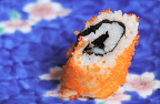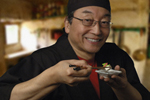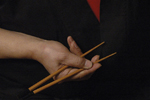 If I didn’t have the honor, benefit, and pleasure of having several good friends that have been brought up in Japan, I think my fascination with Japanese culture would still exist for one source: the book “Shibumi” (1979) by Trevanian. I picked this up just after my move to Boston and that one copy has been reread by me so many times that the cover is gone and the rest of it is held together by rubber bands, when not being read. A hard-bound copy (if I can find one) is one of the first luxuries I intend to buy when I come into some cash. I’ve read just about everything else by Trevanian and have enjoyed his short stories, and his novels: “The Main” and of course “The Eiger Sanction” among others. Outside his writing, part of Trevanian’s appeal was the mystery of the man himself. While he was living, very little was know about Trevanian, including his real name. We now know him as Rodney William Whitaker. “Shibumi” is classified as a “spy-thriller” but could be just as well classified as a spoof of that genre. Trevanian manages to make Ian Fleming’s Bond look like a wimp by comparison to his anti-hero, Nicholai Hel. When “Shibumi” came out in 1979, it was a world-wide success and readers begged for more, but Trevanian in a “been there, did that” attitude went on to more personally enriching endeavors. There’s talk of a movie being made of “Shibumi” and the Trevanian estate has sanctioned a prequel: “Satori” by Don Winslow.
If I didn’t have the honor, benefit, and pleasure of having several good friends that have been brought up in Japan, I think my fascination with Japanese culture would still exist for one source: the book “Shibumi” (1979) by Trevanian. I picked this up just after my move to Boston and that one copy has been reread by me so many times that the cover is gone and the rest of it is held together by rubber bands, when not being read. A hard-bound copy (if I can find one) is one of the first luxuries I intend to buy when I come into some cash. I’ve read just about everything else by Trevanian and have enjoyed his short stories, and his novels: “The Main” and of course “The Eiger Sanction” among others. Outside his writing, part of Trevanian’s appeal was the mystery of the man himself. While he was living, very little was know about Trevanian, including his real name. We now know him as Rodney William Whitaker. “Shibumi” is classified as a “spy-thriller” but could be just as well classified as a spoof of that genre. Trevanian manages to make Ian Fleming’s Bond look like a wimp by comparison to his anti-hero, Nicholai Hel. When “Shibumi” came out in 1979, it was a world-wide success and readers begged for more, but Trevanian in a “been there, did that” attitude went on to more personally enriching endeavors. There’s talk of a movie being made of “Shibumi” and the Trevanian estate has sanctioned a prequel: “Satori” by Don Winslow.
It would take forever to trace Nicholai Hel’s journey throughout “Shibumi,” but if you like extremely intelligent anti-heroes who speak seven languages, become a master in: (among other things) forbidden martial arts, arcane weapons, spelunking, mysticism, culinary arts, the game of Go, and gardening, while becoming the world’s highest paid assassin, “Shibumi” is the book for you. Like I said, Trevanian out-Bonds Fleming’s Bond!
With all his abilities, being vastly influenced by Japanese culture, Nicolai Hel wants only to live a life of “shibumi” which is described in “Shibumi” in rather vague (but later I found to be fairly accurate) terms in the book as a pursuit of the “understated excellence” or “effortless perfection.” For example, Nicolai’s one joy is perfecting his Japanese garden by making it “more simple.”
Outside of the sheer fun of the book, with its rich characters (typical of Trevanian) it is this concept of shibumi that brings me back, time and time again. There’s something very much against the grain of most of American culture in this concept. Most Americans value the “flashy,” the overt. Shibumi is its exact opposite. I once asked Yoshio for a good example of shibumi. He thought for a long while and then said that he observed elder women on the subway in Tokyo dressed in traditional Japanese garb, and for him, that was shibumi. Others have said shibumi exists in the Japanese tea ceremony: where the simplicity of behavior and precision of action of both the person giving and receiving the ceremony define it as shibumi. In art, shibui is defined as a “balance of simplicity and complexity where one continually finds meaning and appreciation.”
Unobtrusive beauty. Understated excellence. Effortless perfection. One could spend a lifetime searching for these. Entertaining spy novels aside, I can think of worse goals than a life striving to attain shibumi!
10.24.11 Update: I just went to the mailbox to find a hardbound version of “Shibumi” from my former student Isaac, as a belated birthday present. Included also was a sweet and funny card from him and Kelly. I have put Isaac’s copy of “Shibumi” on my coffee table and it is very tempting to start it, but I have to first finish “Pendragon” by Catherine Christian, yet another hardbound version of a beloved novel from the very same Isaac. This from many years ago when he actually was my student. Same situation: a loved paperback, ages old, falling to ruin by use. I let slip my concern of its eventual loss in Isaac’s presence. I take out “Pendragon” to read every year, and deliberately space it so that I never tire of it.
I think of books as old friends, and it is a special pleasure to have united a book with a living, breathing, thoughtful, and generous friend. Now, in two instances, I may drink both in, with just a few chapters read. Thank you, my friend. A most wonderful, appreciated, and unexpected gift!






























